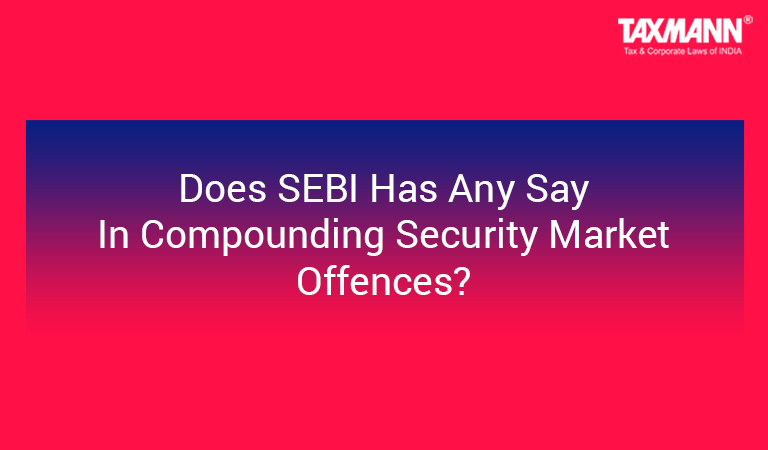Does SEBI have any say in Compounding Security Market Offences?
- Blog|News|Company Law|
- 3 Min Read
- By Taxmann
- |
- Last Updated on 15 December, 2025

[2021] 129 taxmann.com 153 (Article)
The recent decision of the Supreme Court in the case of Prakash Gupta v. Securities and Exchange Board of India,1 has again brought to the forefront the long-standing debate whether the consent of both the parties is required in compounding or not. At first blush, compounding of offences appears to be an aberration of criminal law as a crime is regarded as a wrong in the society and the offender and the victim are not normally allowed to settle between themselves to absolve the offender from criminal liability. However, procedural law gives the parties the option to compound certain offences. The question is whether both the parties should agree to the compromise or whether it can be forced upon a party even if it has objections to compounding. In the instant case, SEBI objected to the compounding application filed by the petitioner. The Court was faced with the question of whether SEBI can be given the veto power to decide to compound and if not, whether SEBI’s view holds any importance in the matter? The author of this article will be discussing the concept of compounding and trace its historical roots. An attempt is made to study the procedure for compounding security market offenses and the supreme court decision on the question of consent by SEBI for compounding offences.
2. Facts of the case
In the instant case, SEBI got a complaint in 1996 against the company alleging price rigging and insider trading. While this company was initially a private limited company, in 1985 its status was changed to a public limited company and in 1995 it made an Initial Public Offer. After a preliminary inquiry, SEBI initiated an investigation against the company in 1999. On 18 November 1999, SEBI appointed an adjudicating officer (AO) to adjudicate upto the allegations. Prior to the decision of AO, SEBI filed a criminal complaint on 29 March 2000 against the company before the Court of Additional Chief Metropolitan Magistrate. In 2006 the petitioner, who is the director and promoter of the company instituted proceedings before the High Court under section 482 of the Code of Criminal Procedure for quashing the complaint case. This application was dismissed in 2013. Thereafter, the petitioner filed a ‘consent application’ with SEBI which was returned by it with an intimation that the petitioner can file an appropriate application for compounding in the criminal case.
In October 2013, the petitioner filed an application under section 24A of the SEBI Act for compounding the offence before the trial court. SEBI did not consent to compound. The trial court relied on the decision of the Supreme Court in JIK Industries Ltd. v. Amaral V. Jumani2 for holding that no application for compounding an offence could be allowed without the consent of the complainant. Revision against this order was filed before the High Court of Delhi. The Delhi High Court relied on Meters & Instruments (P) Ltd. v. Kanchan Mehta,3 and observed that consent of both parties was not required for compounding of offence. However, the revision application was dismissed by the High Court observing that compounding cannot be allowed at the fag end of the trial.
The petitioner then approached the Supreme Court of India through an SLP. The question before the Supreme Court is whether compounding can be allowed without SEBI’s consent or not? It is pertinent to note that though the offence is compoundable, the question is whether SEBI’s consent is mandatory or not for allowing the application of compounding.
Click here to read the full article
Disclaimer: The content/information published on the website is only for general information of the user and shall not be construed as legal advice. While the Taxmann has exercised reasonable efforts to ensure the veracity of information/content published, Taxmann shall be under no liability in any manner whatsoever for incorrect information, if any.

Taxmann Publications has a dedicated in-house Research & Editorial Team. This team consists of a team of Chartered Accountants, Company Secretaries, and Lawyers. This team works under the guidance and supervision of editor-in-chief Mr Rakesh Bhargava.
The Research and Editorial Team is responsible for developing reliable and accurate content for the readers. The team follows the six-sigma approach to achieve the benchmark of zero error in its publications and research platforms. The team ensures that the following publication guidelines are thoroughly followed while developing the content:
- The statutory material is obtained only from the authorized and reliable sources
- All the latest developments in the judicial and legislative fields are covered
- Prepare the analytical write-ups on current, controversial, and important issues to help the readers to understand the concept and its implications
- Every content published by Taxmann is complete, accurate and lucid
- All evidence-based statements are supported with proper reference to Section, Circular No., Notification No. or citations
- The golden rules of grammar, style and consistency are thoroughly followed
- Font and size that’s easy to read and remain consistent across all imprint and digital publications are applied



 CA | CS | CMA
CA | CS | CMA
